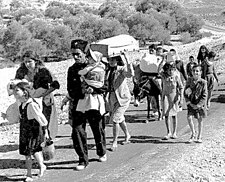 |
| Part of a series on the |
| Nakba |
|---|
In 1969 the Israeli government under Golda Meir approved of a plan to pay 60,000 Palestinians to leave Gaza for Paraguay. At the time, Paraguay was ruled by the Alfredo Stroessner regime, which had agreed in 1967 to go along with the proposal, seeing Palestinians as ideal immigrants out of a need for labor as well as a notion that as mostly Muslims they were not inclined towards communism. At the time the agreement was made, Israel had just occupied Arab territories in the Six-Day War, occupying Gaza with a substantial Palestinian population Israel wanted to systematically remove, in addition to the Sinai peninsula, East Jerusalem, Golan Heights, and the West Bank. While estimates of the exact number of Palestinians sent to Paraguay due to the project vary, ranging from "a few dozen" to "thousands", it is widely agreed that the project was a failure, with the number that made the trip being only a small percent of the 60,000 Palestinians in Gaza the Israeli and Paraguayan governments intended to reach. Under the plan, Palestinians in Gaza were enticed to move to Paraguay by "travel agencies" set up in Gaza to promote emigration to Paraguay; those who moved to Paraguay would be given a one-time lump sum of $100, while the Paraguayan government would be paid $33 per Palestinian it accepted, and after five years of residency they were to become eligible for a path to citizenship. However, upon arrival, having been left in the country with few resources and with no guarantee of employment, they became destitute. Many of those that went had been lured in with false promises of becoming landowners and receiving further financial support, leading to additional frustration.[1][2][3][4][5]
- ^ Kossoff, Julian. "An Israeli plan from 1969 to resettle 60,000 Gazans in Paraguay has been uncovered in a declassified state archive". Business Insider. Retrieved 2021-06-29.
- ^ "Report: Israel tried to expel 60,000 Palestinians to Paraguay". Middle East Monitor. 2020-08-13. Retrieved 2021-06-29.
- ^ Karam, John Tofik (2013). "On the Trail and Trial of a Palestinian Diaspora: Mapping South America in the Arab–Israeli Conflict, 1967–1972". Journal of Latin American Studies. 45 (4): 751–777. doi:10.1017/S0022216X13001156. ISSN 0022-216X. JSTOR 24544505. S2CID 145423526.
- ^ Harkov, Lahav (12 August 2020). "From Gaza to Paraguay? The Israeli government's 1969 transfer plans". The Jerusalem Post. Archived from the original on 2020-08-12. Retrieved 2021-06-29.
- ^ "Paraguay had agreed in 1967 to receive 60,000 Palestinians from the West Bank". MercoPress. Retrieved 2021-06-29.